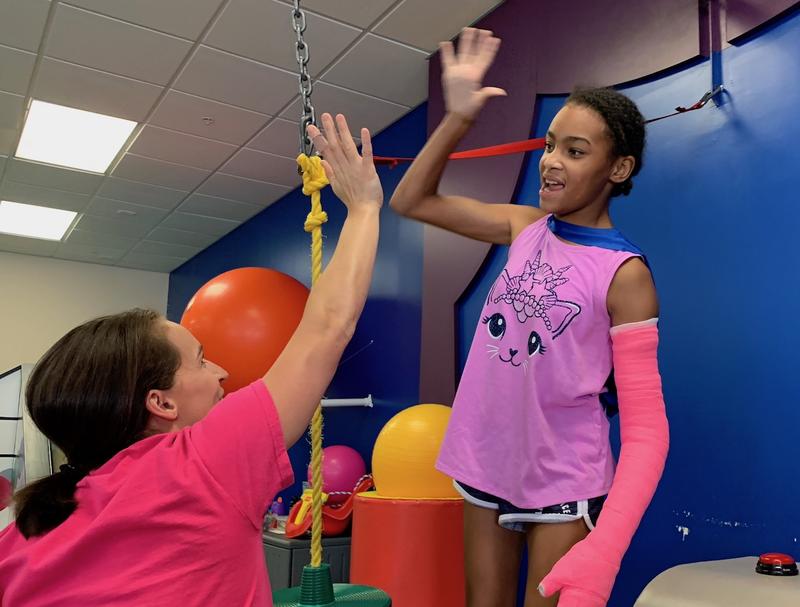
No kids want to go to summer camp with a cast on their arm — especially their dominant hand. No swimming. No running. And so much itching.
“Right there, where you bend your arm, it itches right there,” says 12-year-old Priceless Garinger.
She repurposes a plastic spoon to scratch her elbow underneath a neon pink cast. Her arm is wrapped from shoulder to fingertips. This is actually her good hand. It’s her other arm that’s been the problem since she was born with cerebral palsy.
All the kids at this day camp organized by Vanderbilt Children’s Hospital have a weak side they rarely use, some from a brain tumor or stroke. And “High Five Camp” is meant to force them.
“Yeah, there it is,” Priceless says as she bumps bare arms with a fellow camper.

She takes her turn on the indoor obstacle course at the hospital’s pediatric rehab facility located at One Hundred Oaks. Priceless rides a modified zipline, wrapping her long and lean legs around the swinging seat. She drops into a pit of overstuffed pillows.
The occupational therapists prompt her to climb out. They cheer her on but don’t immediately help. The struggle is the point.
She finds her way out and lies down on a scooter. She grunts as she tries to propel herself with a hand that she can barely control.
“I’m not going anywhere,” she says.
Her therapist gives her a little boost toward the finish line where she hits a buzzer that sounds an alarm and cheers from the campers.
Constrained Therapy
This kind of rehab is known as constraint-induced movement therapy. Similar camps are run by children’s hospitals
around the country during the summer months.
The restrictive rehab is increasingly used with kids who have cerebral palsy, though there
hasn’t been much research showing it’s any better than traditional physical therapy. And some kids become overly frustrated or even refuse to cooperate.
To some, it seems mean.
“If the families have never heard of it before, it’s kind of like, ‘what? You’re going to cast their good arm and take away their really functional hand?” says occupational therapist Stephanie Frazer.
This day camp started a decade ago as part of a research project at Vanderbilt. When the study concluded, it shut down. But
Frazer revived it in recent years because she saw how effective it was.

“Whenever we’re casting that good arm, the brain is like, ‘I have this other arm here.’ And they start using it more and it starts creating pathways,” she says. “They actually make a lot of progress in a short amount of time.”
They have to make progress. Otherwise, they may go hungry.
Even snack time can be therapeutic. Playing with food is required. They take pretzels and stab them into blocks of cheese.
Some blow bubbles in their juice, partly out of frustration. Some resort to using their cast arm to feed themselves.
Seeking Independence
This is the third summer for Priceless, who wasn’t exactly enthusiastic when she started. But she’s beginning to see how helpful it would be to have two hands, like for using a remote control.
“I want to play with my iPad and watch TV,” she says.
The parents are even more motivated because two hands could make independence in adulthood much more feasible. Laura Garinger is Priceless’s mom.

“She talks about wanting to drive. So she’s going to need two hands to drive.”
Garinger says Priceless will use her weak hand more for a few months after this camp, then she reverts to relying on her strong side. But she’s come so far since Garinger, who is a special education teacher in Metro Schools, met Priceless at three years old and adopted her two years later. She required a walker at the time. Now she walks on her own.
But using both hands would go a long way to achieving her dreams.
“She hopes to be a police officer, so the sky is the limit, we’ll see,” Garinger says, pausing as her voice shakes with emotion.
“I mean, it’s probably not realistic, but I always tell her she can do what she wants when she grows up.”
Garinger says the first step for Priceless is strengthening her arm enough to give a high five or even a two-arm hug. But for now, Priceless is just focused on the euphoria that comes with taking a cast off.


